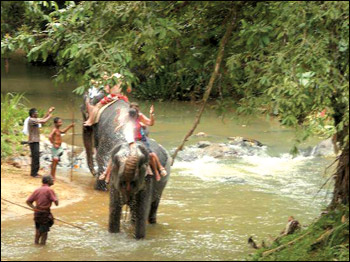Tourism strategy for poverty reduction
Vipula Wanigasekera
Caroline Ashley, Harold Goodwin and Dilys Roe through their work on
Pro-Poor Tourism Strategies (PPT) shed some light on the need to ensure
passing of tourism benefits to peripherals and to the masses which
obviously is the political interest of any Government of the day.
Although vertical integration that takes place in a natural business
environment enables growth and sustainability of tourism in general, it
could be perceived as cartels that control the market and prices in
general. Unfortunately the statistics do not show the real indirect
benefits to the nation that need to be projected to assist policy
making.
The research carried out in South Africa, Namibia, Uganda, Nepal, St.
Lucia and Ecuador deals with the subject of pro-poor tourism (PPT) that
generates net benefits for the poor. PPT is an overall approach, rather
than aiming to expand the size of the sector. This approach is to unlock
opportunities hitherto not seen and exploited.
|

Pro poor tourism goes beyond community tourism |
As Sri Lanka has entered a new era and tourism has already started
taking off, the subject is relevant at a time the authorities
contemplate on product development particularly areas that have opened
up for tourism. A vital part of product development is for economic
gains to enhance the livelihood of the poor in the areas earmarked for
development.
Tourism that is on a development path is expected to increase employment
and reduce poverty. To achieve this in a true sense, the guidelines
would identify the characteristics, one of which is labour intensive
scale inclusive of women and the involvement of informal sector tourism
thus harnessing tourism for pro-poor growth.
The previous case studies show in some countries that pro poor tourism
strategies have not helped generating new opportunities and benefits for
the poor. When this happens tourism will not seem so valuable to the
people and so to the politicians. The public support for the industry
will gradually diminish.
Easier said than done, so one may ask how such strategies are
implemented to please all stakeholders including the informal sectors.
The first step is said to be that those involved in planning tourism -
policy makers, planners, businesses, consultants incorporate pro-poor
concerns at all levels.
Theoretically it is explained as ‘bottom-up social mobilization to
top-down investment packaging.’ Pro poor tourism thus goes beyond
community tourism. It calls for diversity of actions, from planning,
policy making, product and development, marketing.
The driving force of this understanding of the need to serve the poor,
begins from the planning stage with the involvement of stakeholders,
particularly when developing new locations and products and integrating
them into the mainstream of tourism activities.
The private sector naturally demands business viability of any tourism
venture in terms of the demand, product quality, service standards and
skills. The customer orientation is a pre-requisite for business
sustainability that forces them to meet certain business standards.
Private sector will therefore expect State support to harness social
needs through various encouragements and incentives. For instance
external funding may be required to cover the costs of partnerships and
developing skills in rural areas.
Unless the youth in the areas of development are skilled , it will not
be possible for them to be engaged when the products are ready for
operations. This is similar to Safaris that are organized with equity
share with neighbouring experts thus bringing in high percentage of
local staff and supports culturally-based local attractions.
ILO Director-General Juan Somavia - through his work Reducing poverty
through tourism also raises some valuable points. It touches on ‘
Barriers to tourism benefiting poor people’ with examples. Apart from
low literacy and poor job skills, the gender norms affect the women from
working in the tourism sector. This must be overcome through education.
The lack of finance, micro credit, or loan facilities to set up
enterprises as well as seasonal variations may affect smaller business.
In addition many poor communities may live remote from places where
tourism flourishes and they lose the access to the products to do any
business.
Indirect employment can be made possible if the area is simultaneously
developed as a tourism village not only with supply units, shops but
also entertainment. They require technical advice, support and
particularly understanding of the tourism industry and a marketing
drive.
The quality of food produced in nearby areas may not be suitable for
tourists. This is a concern of hoteliers. Another point is that
communities may be unaware of tourist expectations which is partly
caused by lack of language skills.
Somavia’s recommendations include a) Encouraging dispersion of tourism
to poor areas, through infrastructural investment and marketing, b)
Revising regulations that impede the poor in employment or small
business, and support small business more generally and c) Consulting
with residents when making decisions about tourism in their areas.
Some developing countries have the problem of admitting that the country
is in the developing stage. In tourism activities for instance, the
visitors would be more than happy to engage themselves in an activity
that would help the poor as part of their holiday. They return with the
pleasant feeling that they have done something worthwhile in the country
while having a holiday.
|



